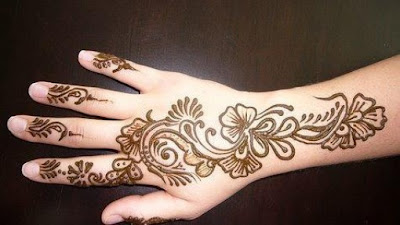
Mehndi or Henna is used for weddings and traditional functions in South East Asia as temporary Henna tattoos and patterns. The henna tattoos are much smaller tattoo designs such as a heart or a bird on the arm or shoulders, but the traditional Arabic mehndi designs are usually adopted by women on weddings and traditional holidays such as Eids. The Arabic mehndi designs are quite unique and can be distinguished by their intricate designs. In South East Asia there is a separate wedding function called mehndi where there are dances, songs and the bride gets imprinted with mehndi designs. Traditionally a bride gets henna designs on her hands, arms and feet. The purpose of these designs is to make the bride look pretty. There are countless types of designs from the completely heavy up to the forearm designs to the minimum and low patterned designs. The good thing about the design is that you can make it look good with just about any way you go, from loops and swirls to flower patterns and even simple line designing. Sometimes people go by starting from the little finger and working their way to the forearm leaving the rest of the fingers blank.
 |
Arabic Mehndi Designs for hands Wedding |
Some brides prefer small and simple designs on their feet while others want heavy patterns till their ankles. It is all about what the bride wants and how creative the artist can be. Other than the bride, the close friends and relatives also put design their hands with the henna although they are usually not as heavy as the bride’s design. Mehndi designs are also used by little girls on Eids, Diwalis and different traditional functions. The weddings are usually seen with little girls and all the females wanting to get their hands decorated with different designs on their hands and arms. There are many catalogues also available with the most popular Arabic mehndi designs such as florals and small designs that people can copy if they like.